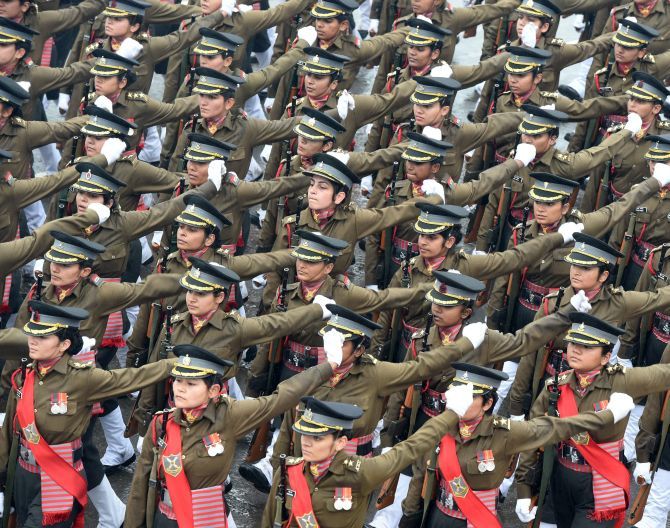
The army has finalised a plan to induct women in the military police, seen as a major move towards breaking gender barriers in the force.
Adjutant General of the Army Lt General Ashwani Kumar said it planned to induct about 800 women in the military police with a yearly intake of 52 personnel.
Another senior official, who did not wish to be named, said some of the women personnel would be gradually stationed in the conflict-torn Kashmir Valley to carry out various kinds of tasks such as frisking of women.
The Adjutant General said the decision to induct women in the Corps of the Military Police was taken keeping in view the “increasing needs for investigation against gender-specific allegations and crime”.
The announcement -- also being seen as a step towards the eventual opening up of doors to women in combat roles – came a day after Nirmala Sitharaman took over as the country’s first full-time woman defence minister.
The decision was conveyed to former army chiefs on Friday by incumbent General Bipin Rawat at the biennial Chiefs’ Conclave where they were also apprised of the overall security challenges facing the country, including on the borders with China and Pakistan.
“We have finalised the proposal of inducting women in the military police,” Kumar told reporters.
in combat roles
1) Germany
2) Australia
3) Canada
4) US
5) Britain
6) Denmark
7) Finland
8) France
9) Norway
10) Sweden
11) Israel
In an interview in June, Gen Rawat had said the army was looking at inducting women jawans and the process would start with the induction of women into the military police corps.
Currently, women are allowed in select areas such as the medical, legal, educational, signals and engineering wings of the army.
The role of the military police includes policing cantonments and army establishments, preventing breach of rules and regulations by soldiers, maintaining movement of soldiers as well as logistics during peace and war, handling prisoners of war and extending aid to civil police whenever required.
The process of induction is likely to start next year. About their proposed deployment in Kashmir, the senior official said women military personnel would assist in tasks such as frisking women, currently being carried out by women constables of the Jammu and Kashmir Police.
“At present, whenever we have to frisk women, we take the help of local women police personnel,” Kumar said.
However, it will be done is a phased manner and will be started with their deployment in peace stations, and then in conflict-prone areas.
The Indian Army is yet to open doors for combat role for women. Very few countries have allowed women in combat roles. The exceptions include Germany, Australia, Canada, the US, Britain, Denmark, Finland, France, Norway, Sweden and Israel.
Kumar also informed the Chiefs Conclave about approval given to a cadre review proposal, which is expected to benefit approximately 1.45 lakh Junior Commissioned Officers/Other Ranks. The upgradation is to take place over a span of five years and will endow higher career progressions of JCO/OR. The last cadre review was done in 1984, benefiting 22,000 JCOs/OR.
Kumar also told the Chiefs Conclave that the Defence ministry had agreed to start residential Army Public Schools in Bhopal in Madhya Pradesh and Mamun in Punjab with a capacity of 2000 children each. This, he said, would cater to the growing needs of children of army personnel of all ranks. As of now, the Army Welfare Educational Society manages 137 schools and 11 professional colleges across the country.











 © 2025
© 2025